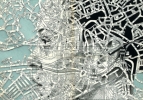The construction of a “public” discourse for Athens centre: media, migrants and inner-city regeneration
Δημοσιεύθηκε: 10/08/2012 Filed under: English, Ο λόγος για την πόλη | Tags: athens centre, Κέντρο, Ρατσισμός, γκέτο ΣχολιάστεΠαρουσίαση στα πλαίσια του Διεθνούς Συνεδρίου του RC21που έγινε στο Άμστερνταμ 7-9 Ιουλίου 2011. Presentation in the International RC21 conference held in Amsterdam, 7-9 July 2011.
Penny Koutrolikou, Dimitra Siatitsa
Abstract
Since the late 90s, diversity and difference have been celebrated as a key feature and asset of urban life. However, the beginning of the 21st century has witnessed a rise of ‘phobias’ of the ‘Other’ (and particularly of Muslim Others) and, at least in Europe, a simultaneous rise of far-right politics that was joined by conservative declarations about the death of multiculturalism. In this context, cities become a contested terrain representing both the possibilities of multicultural living and learning, and the places of difference, exclusion and sometimes fear. Migration and its spatialities are represented as the ‘new’ urban problem in European cities. Concerns about deprived urban neighbourhoods, about segregation or even ghettos are frequent and are often accompanied by statements and programmes about social mix and urban revitalisation (or even promoted gentrification).
Through the case of Athens, this paper wishes to analyse the political, social and spatial discourses that seek to reshape the realities of central neighbourhoods and the ‘common’ public perceptions about the city centre. We will examine how the construction of a public ‘media’ discourse (the media, the politicians, the emergence of the ‘ghetto’ discourse and the politics of fear, the monopolisation of public discourse by conservative or even far-right views) is intertwined with the inner city revitalisation agenda. Namely how the adoption of above mentioned discourse by the relevant ministries and institutions as a de facto reality that defined the way to address the “problems” through state-promoted gentrification (coupled with arguments about desirable resident groups and architectural competitions as remedy for “social ills”) leads to the imposition of a neoliberal agenda for the centre of Athens, through securitisation and policing. Although the case of Athens is not unique, it can be seen as exceptional or even extreme example due to its lack of actual urban or integration policies, to the emergence of the “ghetto” discourse as a tactic for urban regeneration and due to the far-right representations and actions that dominate the TV media, further enhanced in the context of the current crisis. Διαβάστε τη συνέχεια του άρθρου »
Κυρίαρχες πολιτικές και διεκδικήσεις «από τα κάτω» για τη ζωή στην πόλη
Δημοσιεύθηκε: 21/06/2011 Filed under: David Harvey, Δράσεις | Tags: David Harvey, γκέτο, δικαίωμα στην πόλη ΣχολιάστεΣυζήτηση με τον David Harvey με την ευκαιρία της επίσκεψής του στην Αθήνα, με μέλη της ομάδας EncounetrAthens*
Ο David Harvey, καθηγητής του Τμήματος Ανθρωπολογίας του Πανεπιστημίου της Νέας Υόρκης (CUNY) και ένας από τους σημαντικότερους εκφραστές της κριτικής γεωγραφικής σκέψης, βρέθηκε στην Αθήνα την τελευταία εβδομάδα του Μαΐου ως προσκεκλημένος ομιλητής του Διεθνούς Αντιεξουσιαστικού Φεστιβάλ B-Fest. Πριν την ομιλία του εκεί, έδωσε ανοικτή διάλεξη στα Σεμινάρια Ριζοσπαστικής Γεωγραφίας που οργανώνει ο Κωστής Χατζημιχάλης, καθηγητής στο Χαροκόπειο Πανεπιστήμιο. Εκεί τον συναντήσαμε πρώτη φορά, ενώ αμέσως μετά το Σεμινάριο βρεθήκαμε στο Σύνταγμα, στην πρώτη συγκέντρωση – λαϊκή συνέλευση της πλατείας. Εκείνες οι μέρες σημαδεύονταν επίσης από το ξέσπασμα της ρατσιστικής βίας σε κεντρικές γειτονιές και την ανακοίνωση του «Σχεδίου Δράσης για το Κέντρο της Αθήνας» από την κυβέρνηση και τη δημοτική αρχή. Η εκρηκτική επικαιρότητα των ημερών έδωσε το έναυσμα και τα ερεθίσματα για μια σειρά συναντήσεων, επισκέψεων στις γειτονιές του κέντρου και πολύωρων συζητήσεων, από τις οποίες μεταφέρουμε εδώ ένα μικρό μόνο απόσπασμα. Διαβάστε τη συνέχεια του άρθρου »
O κυρίαρχος λόγος για το κέντρο της Αθήνας…
Δημοσιεύθηκε: 15/05/2011 Filed under: Ο λόγος για την πόλη | Tags: Κέντρο, Ρατσισμός, γκέτο ΣχολιάστεΚείμενο εργασίας [το κείμενο σε pdf]
Καλαντζοπούλου Μαρία, Κουτρολίκου Πέννυ, Πολυχρονιάδη Κατερίνα
Οι όροι με τους οποίους περιγράφονται τα πράγματα και οι καταστάσεις δεν είναι ουδέτεροι. Αντίθετα σηματοδοτούν, χρωματίζουν, ή αναδεικνύουν οπτικές και προσεγγίσεις ή ακόμη και ιδεολογίες. Αλλά ακόμη περισσότερο αποτελούν το ουσιαστικό συστατικό της τέχνης της πολιτικής αλλά και των – προτεινόμενων – πολιτικών… Προωθούν ιδέες, παρουσιάζουν καταστάσεις, νοηματοδοτούν μέσω της ονοματοδοσίας, εγείρουν συναισθήματα και δημιουργούν πεποιθήσεις… ιδιαίτερα όταν μιλάμε για τους κυρίαρχους ή δημόσιους λόγους… Σε αυτούς, «επιστημονικοί όροι» διαπλέκονται με συμβολικές αναπαραστάσεις, αληθινές ή κατασκευασμένες μνήμες, συναισθήματα ή φόβους και ερμηνεύονται… και όπως κάθε ερμηνεία εμπεριέχουν τοποθετήσεις… ενίοτε και χειραγωγήσεις… Διαβάστε τη συνέχεια του άρθρου »



